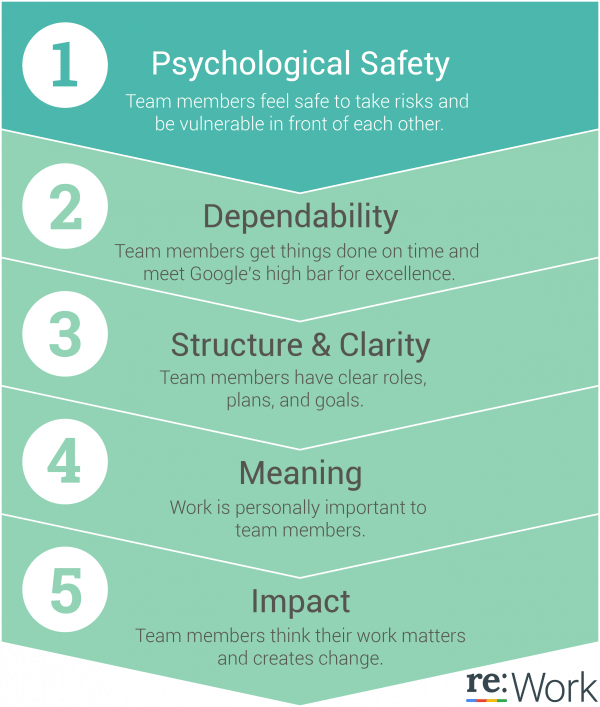How do I build and maintain a successful team? It’s a question with one of the most elusive answers in the business world. And even when the right combination comes together, almost anything can upset the delicate balance.
So some reliable data on how to achieve a successful team would help, right?
Luckily, someone has done the groundwork and has come up with some features of great teams.
Google’s “Five Keys to a Successful Google Team” are based on extensive research into the hearts and minds of their own employees. Though the findings are intended to make Google itself stronger and more effective, what they found is a useful insight for us all.
In this article I’ll cover briefly Google’s Five Keys. You can read the original article here and more about it in Business Insider Australia here.
1. Psychological Safety
The fundamental feature is a work environment where team members feel secure, supported, and safe to take risks without embarrassment or judgement.
In other words, teams only perform well when all members trust one another and feel safe to speak up and contribute ideas, identify problems and offer solutions.
If our primary motivation at work is to watch our own back and stay out of trouble, we’ll probably feel less vulnerable to attack. But we’ll also be less likely to take necessary risks that might need to be taken to progress the business. Makes sense.
The other four features are all based on this first and most critical one.
2. Dependability
Do you trust your co-workers or staff members to keep things running effectively? Get jobs done on time? Let you know when there are problems so they can be fixed early? Do they trust each other?
Successful teams occur when everyone knows that everyone else will hold up their part, and things will happen when they need to happen.
3. Structure and Clarity
Is your team working to an overall plan? Is there a well-communicated strategy for achieving and building upon success? Does each member know what her/his role is, what it contributes to the whole? Is the team working towards a goal?
Excellence can only happen when team members know what they need to do, how and to what standard they need to do it, and where they want to end up. Effective business planning with strategy development, coming from the top, is essential.
4. Meaning
Do your team members arrive looking motivated and ready to do a great day’s work? Or do some of them drag their feet last through the door and first out of it? Do they feel that they are an important part of a successful team and business, or just another hired hand?
A sense of personal investment is critical for good outcomes. Few people do well when they don’t care. Pride of group achievement and the shared sweet scent of success are great motivators.
5. Impact
For those of us in the health profession, this is a slam-dunk: do we think what we are doing matters? Of course we do. We wouldn’t work in this industry if we didn’t, and our staff often absorb this same sense of meaning from their work in supporting ours.
Feeling that our contribution is directly or indirectly benefitting the business/the community/other people taps into powerful altruistic motivators and helps us to push ourselves to do the best we can.
The outcome
“We were pretty confident that we’d find the perfect mix of individual traits and skills necessary for a stellar team — take one Rhodes Scholar, two extroverts, one engineer who rocks at AngularJS, and a PhD. Voila. Dream team assembled, right?
We were dead wrong. Who is on a team matters less than how the team members interact, structure their work, and view their contributions. So much for that magical algorithm.”
(Julia Rozovsky, Analyst, Google People Operations)
It seems intuitive: team members who feel valued, needed and appreciated are more likely to be positive contributors and push the organisation towards success. And yet so many of our businesses and workplaces fail to create a setting in which we can achieve this.
Forming a great team can be a matter of luck. By considering some of Google’s features – and creating the right business environment for them to flourish – we benefit our businesses and workplaces, no luck required.





